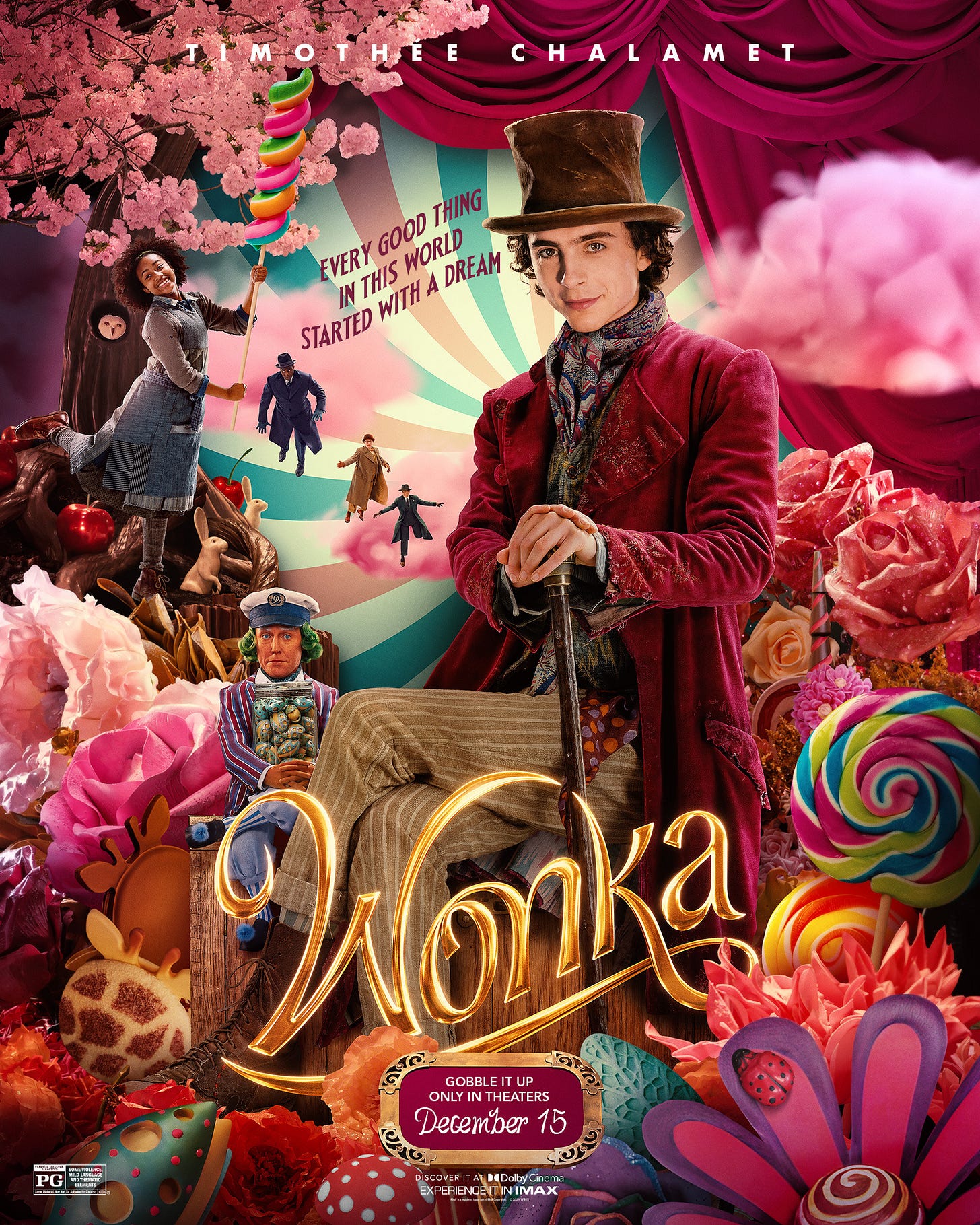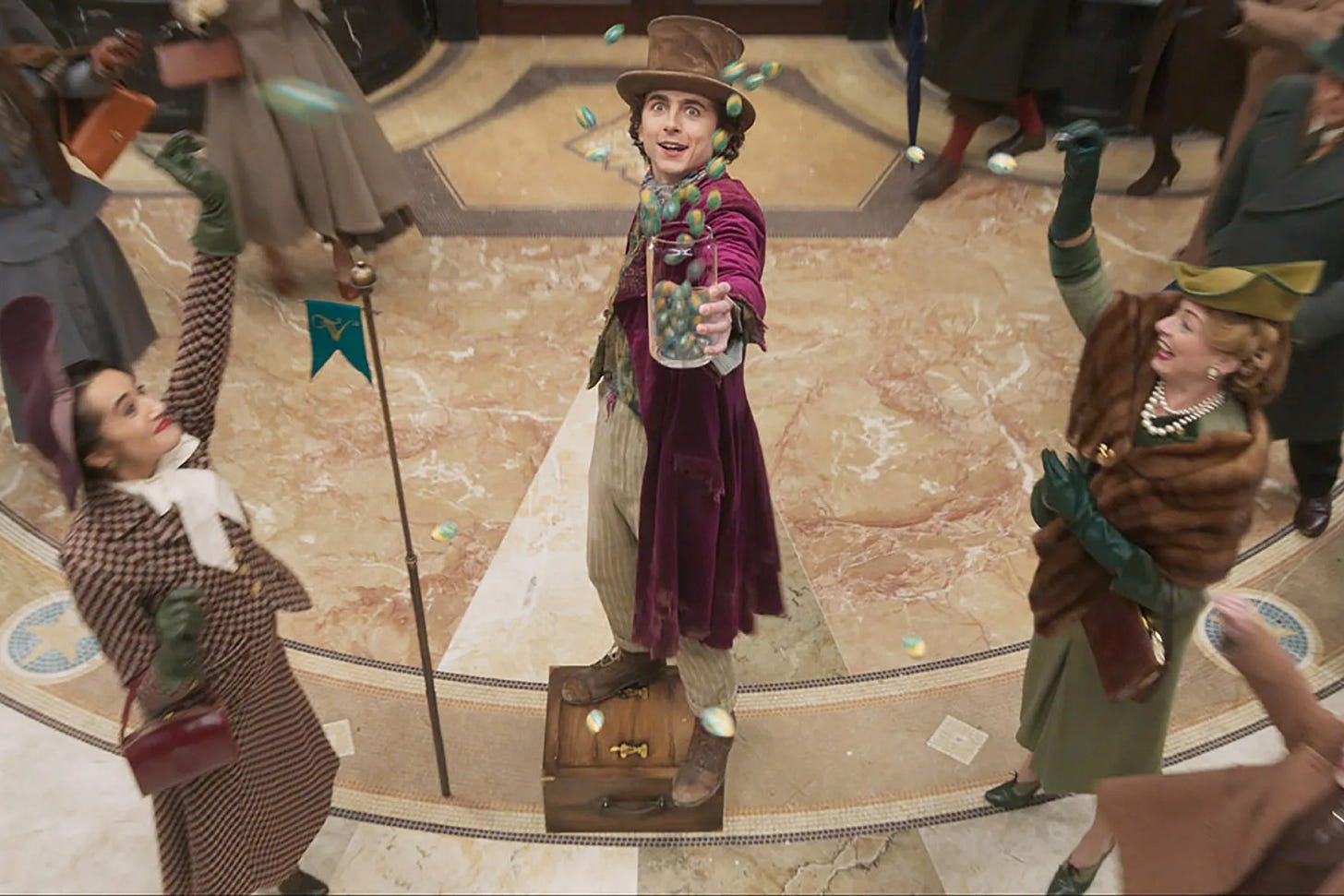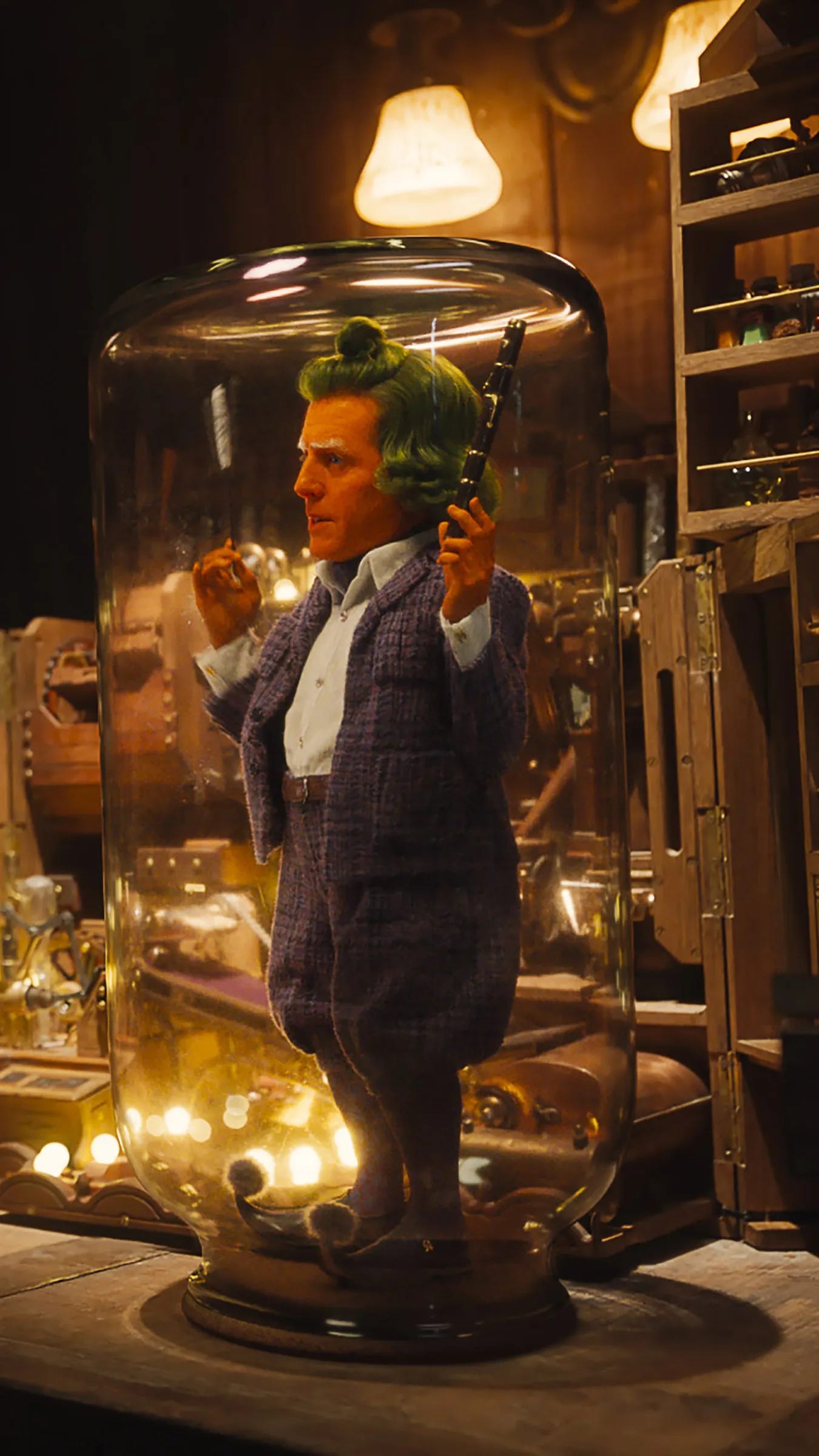Candy has never been cornier

Willy Wonka, cinema’s most wonderous chocolatier, is back on the big screen. Wonka bills itself as a prequel, and places Timothée Chalamet in the titular role and Paul King, the man behind the delightful Paddington duology, in the director’s chair.
I entered the theater knowing next to nothing, as I am wont to do. A Willy Wonka origin story could go in several strange and novel directions. Unfortunately, Wonka refuses these opportunities at every juncture. Instead, the film is safe to the point of sanitization. It’s a toothless cash grab that banks on a pre-existing intellectual property that brings nothing new and, even worse, seems to fundamentally misunderstand the unique selling point of Willy Wonka’s character.
I love Willy Wonka and the Chocolate Factory (1971) and I have a strong affinity for Charlie and the Chocolate Factory (2005), the much-maligned remake from Tim Burton. Both films usher viewers into a candy-coated wonderland that belies the darkness at its center. The essential ingredient in Willy Wonka’s appeal is his weirdness.
Take, for example, Willy Wonka’s introduction in Burton’s iteration. The imposing, gothic factory towers over the visitors. They enter through the gates only to be greeted by an animatronic puppet show that goes awry in a deliciously strange fashion.
Tonally, it facilitates the introduction of Johnny Depp’s Willy Wonka: a pale freak sporting a fuck-ass bob and zero social skills. For years I’ve tolerated people shitting on Burton’s remake because it is, without a doubt, inferior to the original.
The advent of Wonka, an unbearably corny “prequel” that’s indistinguishable from the live-action trash Disney has been pumping out for a decade, necessitates a collective reevaluation and cultural reckoning with Burton’s Charlie and the Chocolate Factory.
You may not love Burton’s film, but you’d have a difficult time convincing me that Wonka is a better film in any regard.
With that being said, I am open to and eager to hear any opinions to the contrary. I remain utterly vexed by Wonka’s positive critical reception. Perhaps you, my dear reader, can explain what I am missing.
The original film, and the book it is based on, is a morality play about bratty children who may or may not have survived their visit to Wonka’s Chocolate Factory. There remains the distinct possibility that dead children are the secret ingredient to Wonka’s legendary candy.
With happy songs like “The Candy Man,” “I’ve Got a Golden Ticket,” and “Pure Imagination,” it’s easy to forget that Gene Wilder’s original characterization of Willy Wonka was tinged with esoteric misanthropy. This latent darkness manifests in the iconic “Tunnel of Terror” sequence that directly follows “Pure Imagination.”
All of this is to say that Willy Wonka is, and always has been, a raving lunatic. His madness and his genius go hand-in-hand. It’s what makes him interesting to watch. He is a bitter recluse who lives in an edible wonderland of his creation.
How did Wonka become a man so fanciful yet twisted? Fuck if I know, because Wonka is only nominally a prequel. It offers no new or novel information about the character. Its connection to the source material is tenuous, grafted together through a series of superficial references.
Willy Wonka, as embodied by Timothée Chalamet, is a simpleton that makes magical chocolate. That’s all there is to it. He sets out to make a name for himself with an unbridled optimism that zaps the film of any emotional or psychological dimension.
There are some half-baked statements about society. An oligopoly known as The Chocolate Cartel stands in Wonka’s way. By now, big studio productions are aware of growing anti-capitalist sentiments and are well-versed in creating capitalist straw men to act as villains.
The church is also prominently featured and depicted as a corrupt institution, an odd creative choice that seems to be a subtextual reference to the systemic sexual abuse of children? I can't fathom another reason for its inclusion. Perhaps I’m overthinking things. If so, you must forgive me. I was dreadfully bored.
Before you tell me, “Wonka is a movie designed for children!” I would politely remind you that Willy Wonka films have always been made for children, they’ve just never been so facile. There is an audience for this film. It may prove to be a crowd-pleaser in the same vein as The Greatest Showman (2017) — a film that I also dislike.
It’s not that Wonka is poorly constructed to the point of being unredeemable. I just hated it. Watching Wonka was like expecting artisan chocolate and being served a half-melted Hershey bar instead.
“For a moment, life doesn’t seem quite so bad. / For a moment, I kind of forgot to be sad.”
-Real song lyrics from Wonka
As the above lyric suggests, Wonka is lazy and painfully unimaginative. To paraphrase better lyrics from a better movie: “If you want to view paradise, simply watch a different movie.”
Subscribe to Acquired Tastes for a free newsletter delivered every Sunday!
Until next week, happy New Year, film freaks!





I haven't seen this film (nor do I want to), but this is a wonderful review. I love your observations about what makes Willy Wonka a great character and where this film goes astray from the get-go, trying to sanitize his nature and the story's intentionally dark subtext (have the screenwriters ever read Roald Dahl?). Such smart, pithy commentary--and I love how you provide the proof from the lyrics.
Reading your review is more entertaining than the movie was to watch.